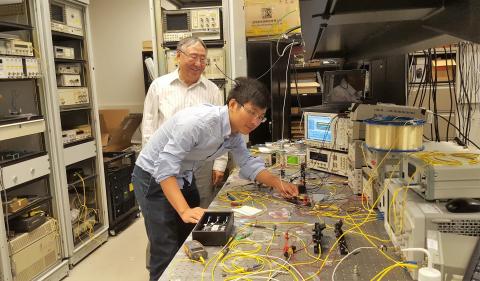ECE Postdoctoral Research Fellow Junwen Zhang has been named as a 2016 Paul Baran Young Scholar Award recipient by the Marconi Society.
The Marconi Society, dedicated to furthering scientific achievements in communications and the internet, will honor Junwen Zhang, a postdoctoral research fellow at the Georgia Institute of Technology’s School of Electrical and Computer Engineering, with the 2016 Marconi Society Paul Baran Young Scholar Award. The 28-year-old researcher, who received his Ph.D. from Fudan University in Shanghai, will be honored at the Computer History Museum in Mountain View, California on November 2, 2016.
In a world where internet traffic is growing exponentially, Zhang focuses on advancements that will deliver high speed, high spectral efficiency, better quality, and more responsive services to businesses and consumers around the world. Zhang has been developing next generation integrated fiber-wireless access technologies to deliver the increased network capacity and expanded coverage areas that emerging wireless standards like 5G will require. His contributions include achieving record-breaking transmission speed in 400Gbps transport systems and developing a robust wireless link system that will deliver stable data throughput in diverse weather environments.
“Dr. Zhang has distinguished himself with a unique ability to identify research challenges and create innovative solutions through a rigorous thought process. His work will support advanced communications systems that provide high-speed services and enhance network quality. He is highly productive, publishing more than 130 peer-reviewed technical papers in the last eight years in prestigious journals and conferences,” said Zhang’s nominator, Gee-Kung Chang, Georgia Research Alliance Eminent Scholar and the Byers Eminent Scholar Chair Professor in Optical Networking at Georgia Tech’s School of ECE.
As a 5G Wireless Research Lab integrator and manager of Georgia Tech’s NSF-sponsored Industry-University Cooperative Research Center for Fiber-Wireless Integration and Networking (FiWIN), Zhang collaborates closely with industry members to create projects that are tightly matched with commercial needs. Zhang has co-authored six patent applications. One of his discoveries to improve spectrum efficiency has been embraced by a FiWIN industry member and proposed as a 400G optical transmission standard.
“I choose to work on these issues because many industrial companies are talking about the challenges of 5G and we are solving key 5G problems that can only be accomplished through fiber-wireless integrated networks. Our work shapes the future of the telecom network and it is very relevant to industry needs,” said Zhang.
“I am honored to receive this award because Mr. Marconi was the inventor of radio and he demonstrated the first trans-Atlantic wireless transmission more than a century ago. This was a precursor to 5G wireless communications. The prestigious Paul Baran Young Scholar award bestowed upon me by experts in the field encourages me to continue pushing the boundaries in fiber-wireless networking technology,” remarked Zhang.
Young Scholar candidates are nominated by their academic advisors. Winners are selected by an international panel comprised of engineers from leading universities and companies, and receive a $4,000 prize plus expenses to attend the annual awards event. Three other Young Scholars were also selected this year. Zhang will receive his award at the same event where Brad Parkinson, regarded as the “father of GPS,” will be honored with the $100,000 Marconi Prize.
Read more at the Marconi Society website.
Junwen Zhang’s story on the Marconi website.
Cutline: Junwen Zhang (foreground), works with Gee-Kung Chang in the Fiber Wireless Integration and Networking 5G Lab. They are both affiliated with the Georgia Tech School of Electrical and Computer Engineering.
